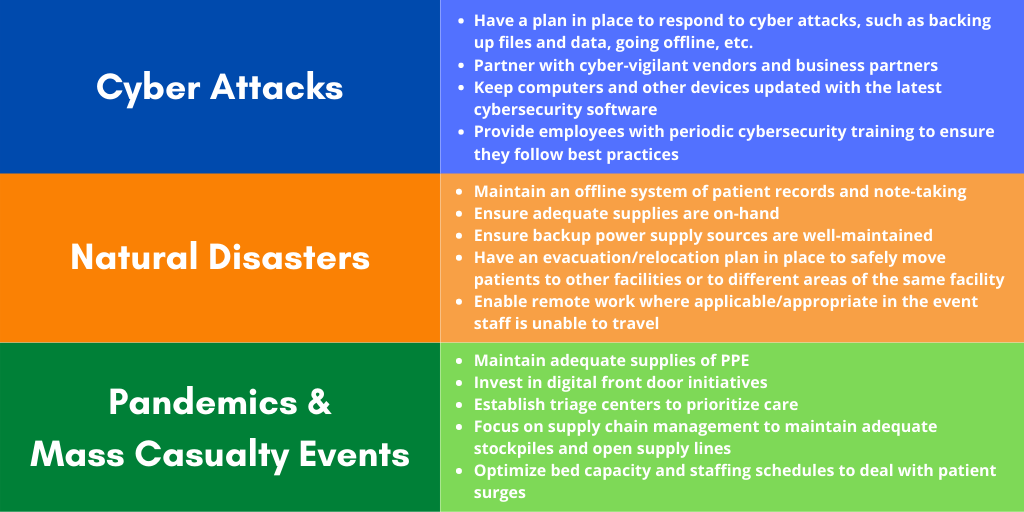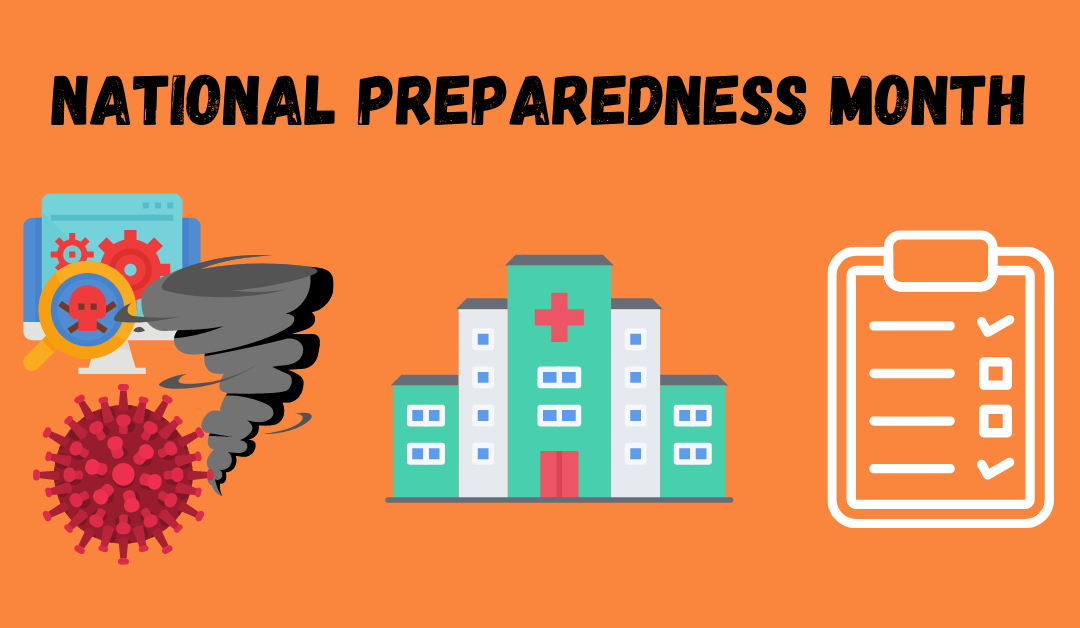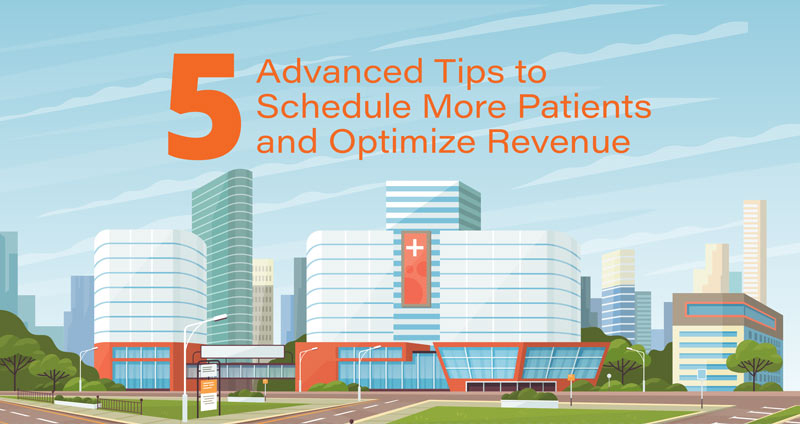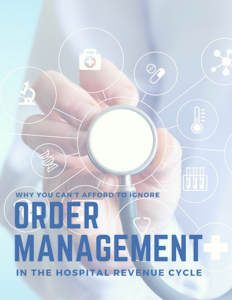September is National Preparedness Month, a time dedicated to raising public awareness of how to prepare for various disasters and emergencies. While it’s important for individuals to be prepared for disasters and emergencies, it’s just as important for businesses, especially hospitals. Three major events hospitals should be prepared for are cyber attacks, natural disasters, and pandemics & mass casualty events. Let’s take a look at each of these types of emergencies and how hospitals can be prepared for each of them.
Cyber Attacks
Cyber crime has become an ever-looming threat in healthcare. A recent report found that ransomware attacks cost healthcare organizations $20 billion in 2020. This was twice as much as 2019 and an average of $9.23 million per attack. The unfortunate truth is a hospital can experience a cyber attack at any given moment. As 2020 showed, cyber criminals don’t take time off, even during a pandemic. Cyber attacks in healthcare are always serious, but even more so during a pandemic when hospital resources and staff are already stretched thin.
Here are some important measures hospitals can take to prepare for cyber attacks:
- Have a plan in place to respond to cyber attacks, such as backing up files and data, going offline, etc.
- Partner with cyber-vigilant vendors and business partners
- Keep computers and other devices updated with the latest cybersecurity software
- Provide employees with periodic cybersecurity training to ensure they follow best practices
Natural Disasters
A major focus of National Preparedness Month is being prepared in the event of natural disasters. Natural disasters, such has hurricanes, earthquakes, and tornados are a major threat to individuals and businesses in the form of physical injury and property damage. Hospitals and their staff are also subject to these threats posed by natural disasters, but they face additional risks and challenges such as:
- Patient surges due to injuries
- Equipment/system failures and food & medicine spoilage due to power outages
- Patient evacuations
- Procedure delays and postponements
While it’s important for households and businesses to be prepared for natural disasters, it’s even more critical for hospitals. In the event of a natural disaster, hospitals will likely see surges in patients, especially emergencies due to injuries caused by the disaster. Power outages could cause critical systems and equipment, such as patient monitoring devices and life support systems, to fail and could also result in food and medicine spoilage in the event refrigerators and freezers are down. Even if the hospital itself isn’t directly affected by the natural disaster, it may be necessary to delay or postpone procedures and exams if it’s unsafe for patients or staff to travel.
To minimize care disruptions and ensure the safety of patients and staff during natural disasters, hospitals can take the following measures:
- Maintain an offline system of patient records and note-taking
- Ensure adequate supplies are on-hand in the event supply chains are disrupted
- Ensure backup power supply sources, such as generators, are well-maintained and functional
- Have an evacuation/relocation plan in place to safely move patients to other facilities or to different areas of the same facility
- Enable remote work where applicable/appropriate in the event staff is unable to travel
Pandemics & Mass Casualty Events
In addition to cyber attacks and natural disasters, hospitals should also be prepared for pandemics and mass casualty events, such as terrorist attacks and mass shootings. In fact, September was chosen as National Preparedness Month in part to highlight the importance of being prepared in the wake of the September 11, 2001 terrorist attacks. The past year has taught us the importance of being prepared for pandemics. From capacity strains to supply shortages, many hospitals found themselves unprepared for the challenges COVID-19 poses.
For pandemics in particular, hospitals should ensure they have sufficient stockpiles of PPE to keep staff safe. The state of California even passed a law that went into effect April 1, 2021 that requires hospitals to keep at least 3 months of PPE on hand. In addition to ensuring the availability of PPE, hospitals should shore up their digital front door initiatives to provide as many contactless and remote-friendly steps to the care process as possible. For example, offering self-scheduling portals for patients and digital image sharing can minimize in-person interactions and the touching of contaminated surfaces.
For both pandemics and mass casualty events, hospitals should consider implementing the following measures to ensure preparedness:
- Establishing triage centers to prioritize care
- Focusing on supply chain management to maintain adequate stockpiles and open supply lines
- Optimizing bed capacity and staffing schedules to deal with patient surges
National Preparedness Month Checklist
We’ve looked at three of the most important disasters and emergencies hospitals should be prepared for: cyber attacks, natural disasters, and pandemics & mass casualty events. We’ve covered many different measures you can take to ensure your facility is prepared for any of these events. Take a look at the summary of preparedness measures below and determine which ones you can already check off and which ones you should plan on implementing.
- Have a plan in place to respond to cyber attacks, such as backing up files and data, going offline, etc.
- Partner with cyber-vigilant vendors and business partners
- Keep computers and other devices updated with the latest cybersecurity software
- Provide employees with periodic cybersecurity training to ensure they follow best practices
- Maintain an offline system of patient records and note-taking
- Ensure adequate supplies are on-hand in the event supply chains are disrupted
- Ensure backup power supply sources, such as generators, are well-maintained and functional
- Have an evacuation/relocation plan in place to safely move patients to other facilities or to different areas of the same facility
- Enable remote work where applicable/appropriate in the event staff is unable to travel
- Maintain adequate supplies of PPE
- Invest in digital front door initiatives
- Establish triage centers to prioritize care
- Focus on supply chain management to maintain adequate stockpiles and open supply lines
- Optimize bed capacity and staffing schedules to deal with patient surges

Implementing the above measures (and more) is a great way to prepare for some of the most common disasters impacting hospitals. However, no plan is perfect. For more tips on preparing for disaster, how to respond when disaster strikes, and how to recover afterward, check out this blog.




